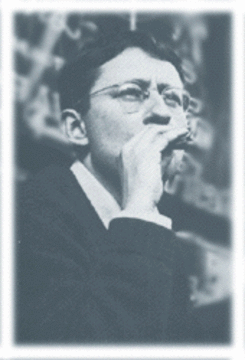Search results for 'situationists'
Guy Debord
The Society of the Spectacle
2002 translation.
Guy Debord
Self-proclaimed leader of the Situationist International, Guy Debord was certainly responsible for the longevity and high profile of Situationist ideas, although the equation of the SI with Guy Debord would be misleading. Brilliant but autocratic, Debord helped both unify situationist praxis and destroy its expansion into areas not explicitly in line with his own ideas. His text The Society of the Spectacle remains today one of the great theoretical works on modern-day capital, cultural imperialism, and the role of mediation in social relationships.
ReadThe Situationists and the New Forms of Action in Art and Politics
The Situationist Movement can be seen as an artistic avant-garde, as an experimental investigation of possible ways for freely constructing everyday life, and as a contribution to the theoretical and practical development of a new revolutionary contestation. From now on, any fundamental cultural creation, as well as any qualitative transformation of society, is contingent on the continued development of this sort of interrelated approach.
ReadTactical Media and the End of the End of History
As a playful, do-it-yourself approach to media activism and new technologies, tactical media (TM) seemed to have some critical bite when it emerged in the mid-1990s. But is it still radical today?
ReadThe Society of the Spectacle @ Bureau of Public Secrets
Translator's Note to the 2002 translation
There have been several previous English translations of The Society of
the Spectacle. I have gone through them all and have retained whatever
seemed already to be adequate. In particular, I have adopted quite a
few of Donald Nicholson-Smith's renderings, though I have diverged from
him in many other cases. His translation (Zone Books, 1994) and the
earlier one by Fredy Perlman and John Supak (Black and Red, 1977) are
both in print, and both can also be found at the Situationist
International Online website.
Post-media operators: "sovereign & vague"
No one recognises these powers as their own
(Why Theory?) We have to dispense with the idea that theorising occurs
after the creative event; that a poem or a track or a text is made and
then, as part of its process of dissemination, there follows the
theorising of the piece. Such a theorising is normally attributed to
those known variously as critics, reviewers and essayists.
Media, Activism and Society of the Spectacle
Our ability to move into a collectively imagined future has been trapped in an ever-present now, composed of continually transmitted images. The spectacle accompanies us throughout our lives. News, propaganda, advertising, entertainment and social media present a continuous stream of imagery, projecting a constant justification for how our culture is formulated. When Guy Debord first published The Society of the Spectacle in 1967, the digital revolution was still decades away and the technological capacity to project images into every corner of our lives was far less developed than it is today. The spectacle is no longer simply all of the time; it is also everywhere. More than ever before, Debord's words apply: "Everything that was directly lived has receded into a representation."
ReadSWARMACHINE
Activist Media Tomorrow*
* BH: When I wrote this text five years ago, it really was not clear whether
the swarming tactics of the counter-globalization movement would get a
"second chance." But they have, and now the subtitle could be "activist
media today."
What happened at the turn of the millennium, when a myriad of recording
devices were hooked up to the Internet and the World Wide Web became an
electronic prism refracting all the colors of a single anti-capitalist
struggle? What kind of movement takes to the barricades with samba bands
and videocams, tracing an embodied map through a maze of virtual
hyperlinks and actual city streets? The organizational aesthetics of the
networked movements was called "tactical media," a concept that mixed
the quick-and-dirty appropriation of consumer electronics with the
subtle counter-cultural anthropology of Michel de Certeau. The idea was
to evoke a new kind of popular subjectivity, constitutionally "under the
radar," impossible to identify, constantly shifting with the inventions
of digital storytelling and the ruses of open-source practice. Too bad
so much of this subversive process was frozen into a single seductive
phrase.
My Postmodernism - My '80s
Filmmaker and activist Gregg Bordowitz's passage through the
1980s mirrors the course of AIDS activism in that decade. From the very
first ACT up demonstration in New York to the triumphal storming of the
FDA headquarters outside Washington, DC, he deployed his art in the
battle against AIDS. Bordowitz leads off this two-issue series of
personal chronicles of the decade, recounting his experiences as an
activist and guerrilla filmmaker at the forefront of the fight.
"Art
does have the power to save lives, and it is this very power that must
be recognized, fostered, and supported in every way possible."
- Douglas Crimp, introduction to AIDS: Cultural Analysis/Cultural Activism (MIT Press, 1988)
The Flexible Personality: For a New Cultural Critique
The events of the century's turn, from Seattle to New York, have shown that a sweeping critique of capitalist globalization is possible, and urgently necessary-before the level of violence in the world dramatically increases. The beginnings of such a critique exist, with the renewal of "unorthodox" economics. [1] But now one can look further, toward a critique of contemporary capitalist culture.
Read

